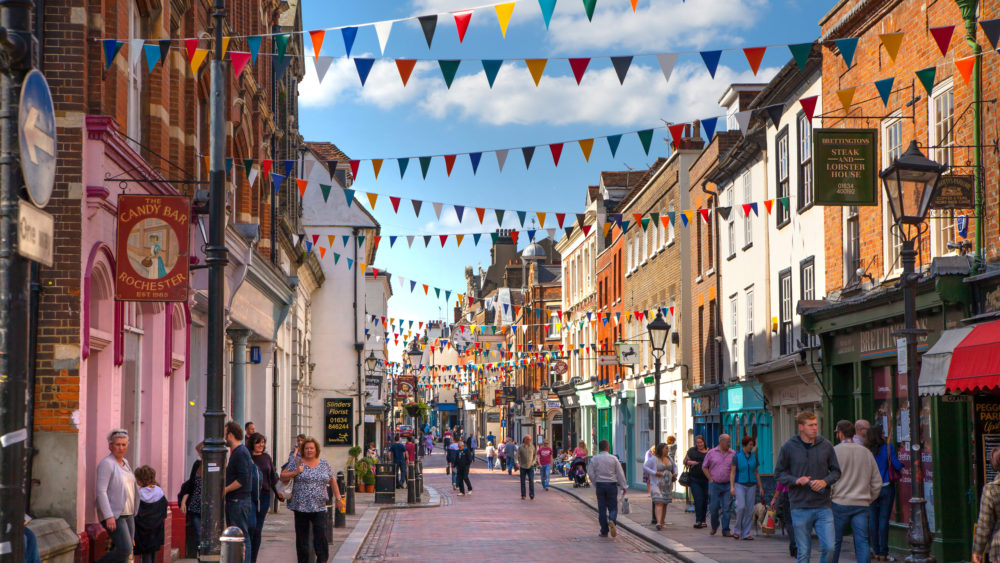We all know that Covid-19 has affected the high street. Lockdown and social distancing restrictions have made the last year an extremely difficult environment for retail and hospitality businesses to operate in. As we prepare to ease restrictions, will the high street look the same when it returns?
Over the last 12 months, there have been numerous headlines announcing high street staples collapsing. Firms that were already struggling fell into administration as Covid-19 severely impacted profitability. Two well-known names that may disappear as a result are Debenhams and Topshop. The situation has also affected many other businesses.
According to the British Retail Consortium (BRC), 2020 was the worst year on record for retail sales growth, with in-store, non-food sales declining by 24% compared to 2019. Footfall was down almost 40% in 2020 as consumers shunned the high street in line with the government’s “stay at home” message. The organisation estimates that the cost of three national lockdowns at £22 billion in lost sales.
Non-essential shops are now expected to open in mid-April, but what impact has Covid-19 had on the future of the high street? Predicting the future is impossible, but here are five expected trends to keep an eye out for on your local high street.
1. Merging digital and physical shopping experiences
The rise in digital sales is nothing new and businesses have been offering “click and collect” options for years to capitalise on digital traffic. But Covid-19 has accelerated the trend. The retailers that have benefitted most from lockdown have had strong, and, in some cases, solely, digital presences. ASOS and Boohoo, for example, saw sales increase by around 40% in the last four months of 2020.
BRC notes that “Buy online, Pick up kerbside” customer experiences have rapidly shifted from a nice-to-have to a must-have. Online sales in 2020 grew by 36% year-on-year, the highest annual growth since 2007. While high streets may be re-opening for business soon, expect the hybrid business model to continue. In fact, 87% of consumers said brands should continue to offer options like kerbside pickup.
2. Sustainability set to become a focus
Again, sustainability is a trend that’s been gathering momentum over the years, but Covid-19 may provide a boost. The pandemic brought some key sustainability issues to the forefront. From how businesses treat employees to supply chain operations, it’s expected that more businesses will make sustainability a key part of their brand.
It’s a trend that could impact shopping habits too. More than seven in ten consumers are expected to hold businesses more accountable than ever. Trust and reputation are now ranked among price and convenience when shoppers are spending money, according to research reported in Fashion United. While we doubt fast fashion will be disappearing from the high street, brands with a focus on ethical sourcing could receive a boost. Expect the trend to spread beyond retail firms to, for example, restaurants with a focus on local produce.
3. More firms will deliver a service
With sales moving online, traditional brick-and-mortar stores will need to focus on delivering services that are difficult to replicate online. Specialised services and expert knowledge will become more important than ever if high street businesses are to survive. Building a brand reputation around delivering excellent customer services could help set businesses apart and play a role in maintaining a thriving high street.
Firms with a social aspect are also likely to benefit. After more than a year of living with social distancing restrictions, people are keen to meet up with family and friends. High street businesses that offer a place to get together could receive a welcome boost in the coming months as consumers focus on enjoying experiences and creating memories together.
4. Flexible rentals could shape the high street
Landlords could struggle to fill traditional office and retail spaces. Many businesses have announced workers will not be going back to the office full-time and expect to scale back the space they have as a result. It means more spaces will be empty and could lead to short-term, flexible leases as landlords try to reduce losses.
If that’s the case, expect the high street to change faster than ever before, with pop-ups becoming far more popular. A space that is a specialist restaurant one month could become a yoga studio the next. One positive of this is that it could allow small, independent firms and entrepreneurs to have a high street presence at key points in their business plans, allowing them to reach more people.
5. Greater appreciation for green spaces
Lockdown has led to us appreciating green spaces more than ever. Whether as a space to exercise or meet up with friends, they have played an important role in lives over the last year, and it’s something we hope will continue. With this greater appreciation, will town and city centres regenerate or plan for more green spaces in the future? Embracing the natural world could encourage more people to visit the high street as they combine the outdoors with shopping or eating out.


